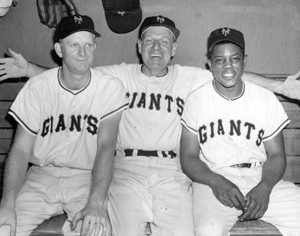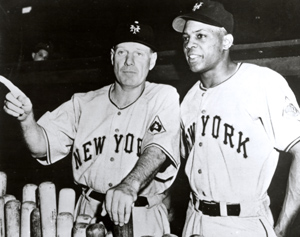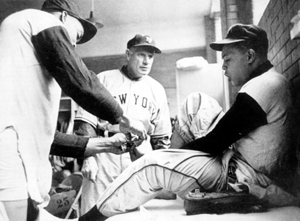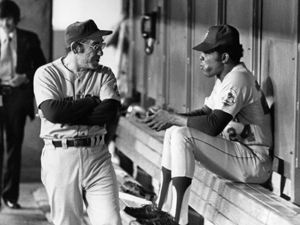Willie Mays and His Managers
This article was written by Mark S. Sternman
This article was published in Willie Mays: Five Tools (2023)

Whitey Lockman and Willie Mays made Giants manager Leo Durocher a happy man. (National Baseball Hall of Fame Library)
The ties linking superstars and managers follow patterns often beginning as mentee-mentor before changing into relationships of equals, then deference to the player based on his status, and, finally, awkwardness as the star’s skills (but not his ego) deteriorate with age. On the one hand, Willie Mays and his managers followed this typical arc; on the other hand, Mays faced challenges as one of the first Black greats in the National League who had to play for a racist. Personal ups and downs notwithstanding, the records of the 11 men who managed the future Hall of Famer in professional baseball show how pronounced an impact Mays had on the teams for which he played.
Piper Davis: 1948 Birmingham Black Barons
- Pre-Mays: n/a
- With Mays: 51-27 (.654)1
- Post-Mays: n/a
Mays had the good fortune as a teenager to debut under the friendly but firm Piper Davis in the Negro American League. As Mays recounted 40 years later, “Piper was the most important person in my early baseball years. I learned one thing about him very quickly. He told you something only once, and he expected you to go from there. That’s a big reason why I matured so quickly. …”2
The lessons Mays picked up from his skipper, who also hit .393 that year for Birmingham, would serve Mays well when he faced pitchers like Don Drysdale and Bob Gibson who thrived on making batters uncomfortable at the plate. After getting hit by Chet Brewer, Mays admitted, “I’m on the ground crying. … Piper comes out, kicks me, and says, ‘There ain’t no damn crying in this game. … What you do now, you steal second, you steal third.’ So I steal second and third, and I score. … Piper comes over to me … and says, ‘Now that’s the way you play baseball.’”3
Mays played just 13 games with the Black Barons in 1948. He stayed with the team in 1949, playing 75 games,4 but that season in the Negro American League has not been elevated to major-league status.5
Mays played another quarter-century but never again played for a Black manager.
Chick Genovese: 1950 Trenton Giants
- Pre-Mays: 72-73 (.497)
- With Mays: 73-65 (.529)
- Post-Mays: 333-387 (.463)
In his final teenage season, Mays played one campaign in the Class-B Interstate League, where he first demonstrated his star potential over the course of 81 games. In a pattern that recurred in his early years, Mays seemed slow to recognize his own skills. Accordingly, Genovese had to instill confidence in his young player, not too difficult a task given that he called Mays “the best-looking young player I’ve seen in many a day,” and added, “I played with Louisville when Duke Snider was at St. Paul and always thought Duke would become a tremendous hitter. Willie doesn’t have Duke’s power, but he could do everything else better.”6 Genovese “made it his mission to get the young center fielder all the way to the majors. He identified Mays’ problem in those first few games – he was pressing, overeager to make a good first impression.”7
Having raised his batting average from .233 in Birmingham to .353 in Trenton, Mays, with the help of Genovese, clearly gained the confidence he needed to advance one step closer to the National League.
Tommy Heath: 1951 Minneapolis Millers
- Pre-Mays: 335-249 (.574)
- With Mays: 77-75 (.507)
- Post-Mays: 974-1096 (.471)
Amazingly, Mays had an even greater jump in batting average when he advanced to Minneapolis, where he hit an astounding .477 with 30 RBIs in 35 games. Heath “knew he would not have Mays for long. One morning, Heath called him into his office and said, ‘Willie, we’re taking you … to Minneapolis, but I … have the feeling that you’re not going to spend the whole summer with us. I think it’s only a matter of time before the Giants call you up.”8
Despite his prowess, Mays did not want to leave Heath and the Millers to go to New York, but he reluctantly went.

Willie Mays worried that he could not hit big-league pitching. Leo Durocher told his young ballplayer not to worry. (National Baseball Hall of Fame Library)
Leo Durocher: 1951-1955 New York Giants
- Pre-Mays: 955-771 (.566)
- With Mays: 350-233 (.600)
- Post-Mays: 703-705 (.499)9
Mays had another model player-manager relationship with Durocher, who could straight-talk his center fielder while simultaneously supporting him. The Giants promoted Mays from the minor leagues on May 25, 1951, and batted him third in the order even after he went hitless in his first 12 at-bats before homering off Warren Spahn. While Durocher later moved Mays throughout the lineup over the course of the famed 1951 campaign, the manager always kept faith with his prized rookie.
As recounted by Paul Dickson in his Durocher biography, “Mays said he just couldn’t hit big league pitching. Durocher replied, ‘As long as I’m the manager of the Giants, you are my center fielder. … You are the best center fielder I’ve ever looked at.’ Then he told Mays to hitch up his pants to give himself a more favorable strike zone.”10
Mays and Durocher went to two World Series in their five years together. As Mays became one of the best players in the game, Durocher understandably treated him differently from the other Giants. “‘Leo had all these friends in the clothes and jewelry business,’ [fellow New York outfielder Monte] Irvin said, ‘and Willie’s locker was just full of stuff Leo got from them – shirts, ties, watches. … Leo did all these things for Willie and forgot about the rest of us.”’11

“If somebody came up and hit .450, stole 100 bases, and performed a miracle in the field every day, I’d still look you right in the eye and tell you Willie was better.” — Leo Durocher (SABR-Rucker Archive)
Bill Rigney: 1956-1957 New York Giants and 1958-1960 San Francisco Giants
- Pre-Mays: n/a
- With Mays: 332-342 (.493)
- Post-Mays: 907-979 (.481)
Starting with Rigney, Mays never again played for a Giants skipper with prior major-league managerial experience. The front office seemed to think novices could guide a team led by a player as great as Mays. Perhaps as a result, Mays went to only one more World Series with the Giants in his many remaining years with the team.
Maybe Mays should have no longer needed a boost from his manager and teammate during the 1951 and 1952 seasons, but he “suffered badly from the departure of [Durocher]. In the words of one long-time Giant, ‘Rigney was out to prove that Willie was just one of twenty-five men. You could see Willie looking … for a couple of kind words, but Rig never … had a smile for him.’”12
Of all the managers who had Mays for at least one full season, only Rigney posted a losing record. Rigney strangely failed to appreciate one of the strongest aspects of the game of the slugger and his best player (Mays led the Giants in WAR every season from 1954 to 1965): “It is Rigney’s belief that if Mays will forget about home runs and consistently punch the outside pitch into right field, he can hit .380,” according to sportswriter Ed Linn.13
Tom Sheehan: 1960 San Francisco Giants
- Pre-Mays: n/a
- With Mays: 46-50 (.479)
- Post-Mays: n/a
Mays experienced his first in-season managerial change in 1960 when the senior citizen Sheehan had his first and only managerial job. Sheehan turned an underachieving winning team into a losing one, but initially understood his good fortune in getting the surprising opportunity to manage Mays.
Under Sheehan, Mays “went on a 19-game tear during which he hit .494. … [H]e made a leaping catch … to rob Gil Hodges of a homer, and the normally hostile Coliseum fans … burst into cheers. ‘He’s the greatest center fielder I ever saw,’ [said] Sheehan, ‘and I saw [Tris] Speaker and [Joe] DiMaggio. I don’t know how they could be better.’”14
Sheehan’s superlatives notwithstanding, the two clashed near the end of the manager’s brief tenure. In the waning weeks of the 1960 season, Mays twice sought leave to take care of personal matters in New York. Sheehan gave him permission the first time, but not the second, threatening him with a fine if he did not show up for a game in Philadelphia. Mays, maybe with his pocketbook in mind, relented.15
Alvin Dark: 1961-1964 San Francisco Giants
- Pre-Mays: n/a
- With Mays: 366-277 (.569)
- Post-Mays: 628-677 (.481)
Dark had the best regular-season winning percentage of all the Giants managers who had Willie on the team, but Dark’s bigotry rightly damaged his reputation.
Dark, another former teammate of Mays, certainly appreciated his superstar and “often said Mays was the greatest player he had ever seen.”16 Early in the 1964 season, Dark appointed Mays captain, saying, “Mays is a leader, without even opening his mouth.”17
This praise notwithstanding, Dark singled out Black players for criticism, comments that irreparably harmed his legacy.18
Mays did not share this perspective. After Dark died, Mays observed, “It’s a sad day for me with all the help he gave me. He was such a mentor to me.”19
Herman Franks: 1965-1968 San Francisco Giants
- Pre-Mays: n/a
- With Mays: 367-280 (.567)
- Post-Mays: 238-241 (.497)
Even before he managed his first game, Franks understood where he stood vis-à-vis his star player: “When you’ve got Mays on your side, you’re starting out ahead. No team can win with just one man, but Willie is a winning force. He gives the team everything he’s got. Managers don’t win pennants; it’s the horses.”20
Mays appreciated how Franks asked for his input in contrast to “when [Dark] first named me captain, it was pretty much an empty honor outside of taking lineup cards to the plate before each game. Now it’s different. [Franks] talks to me about many subjects involving the players.”21
In a sign of their strong relationship, Mays stayed in touch with Franks even after the latter had lost his managerial position. As quoted in the New York Daily News, Franks said, “Willie and I talked about his playing out the string in New York. So, we have done some thinking about it together.”22
Clyde King: 1969-1970 San Francisco Giants
- Pre-Mays: n/a
- With Mays: 109-95 (.534)
- Post-Mays: 125-134 (.483)
Mays appreciated how Franks “gave me more rest … than any manager I’ve ever had. That’s because the rest spells came at the right time. My other managers took me out when they thought I was tired. The trouble with this is that they didn’t really know. I’m the only one who knows that.”23 Mays lacked that same rapport with Franks’ successor, Clyde King.
Before a game in June of King’s first year at the helm, he noticed that Willie was not on the bench to bring the lineup card to home plate, and angrily scratched Mays’ name from it. … Mays arrived in the dugout seconds later, and … was furious.”24
King learned that although he may have had the top title, he did not have the most power and apologized for the snafu: “Hereafter, I will check with Mays daily. … I made it clear to him that I won’t push him when he feels tired and unable to play.” Mays’ comment: “It wasn’t much of an argument,” commented Willie, who said he was a “lover” and not a “fighter” and that the manager’s version was accurate.25
Charlie Fox: 1970-1972 San Francisco Giants
- Pre-Mays: n/a
- With Mays: 165-141 (.539)
- Post-Mays: 212-230 (.480)
Remarkably, Mays played under his sixth consecutive rookie manager when Fox replaced King during the 1970 campaign. Fox treated the veteran Mays with deference. After he “delegated coaching of the outfield to Mays,” Bobby Bonds and Ken Henderson played better in the field. “Willie and I have a great rapport going,” Fox said. “I … let him play a week or 10 days, and then give him a day or two off.”26

Manager Yogi Berra and Willie Mays sometimes clashed during Mays’ time with the Mets. (SABR-Rucker Archive)
Yogi Berra: 1972-1973 New York Mets
- Pre-Mays: 113-70 (.617)
- With Mays: 152-146 (.510)
- Post-Mays: 220-229 (.490)
The deference days did not carry over when Mays returned to New York to play for the Mets in May 1972. The pairing of Mays and Yogi Berra, which in the 1950s or early 1960s would have worked out well for both men, worked out for neither in the early 1970s. As we have seen from his last San Francisco experience, “With the Giants, Mays had been allowed the privilege often given to longtime aging superstars to dictate when he would play. … But Yogi had been criticized in 1964 for losing control of his Yankee ball club, and he adamantly refused to let Mays dictate anything.”27
Mays “was a huge pain in the ass [to Berra]. By the final month of the [1972] season, with the Mets playing well but out of the pennant race, Mays was openly criticizing Yogi for playing him too much – a strange complaint, as Mays batted just 195 times during the season”28 in 69 games.
As Berra said before the start of the 1973 season, “I appreciate that Willie isn’t 18 years old –he’s 42. But you can’t have two sets of rules.”29
The 1973 Mets amazingly made the World Series, but more despite the aged Mays than because of him, a sharp contrast to the starring role Mays had played for so long with the Giants.
Totals:
- With Mays: 2088-1731 (.547)
- Without Mays: 5815-5991 (.493)
The 11 men managed 11,806 games for teams that did not have Mays on the roster; in those contests, they lost 176 games more than they won. With Mays on the team, however, the managers had a great deal more success, finishing 357 games over .500. Mays overcame the challenges of playing for so many average managers and led his teams to steady on-field success.
The first World Series that MARK S. STERNMAN dimly recalls involved Willie Mays and the 1973 Mets. At the age of 5, Sternman watched some of the games on a small television. He regrets not having had the chance to see Mays play in the prime of his career.
NOTES
1 Neither Baseball Reference nor Seamheads has game-by-game results for the teams Mays played for before joining the Giants, and the “With Mays” records for Birmingham, Trenton, and Minneapolis all reflect the full 1948, 1950, and 1951 seasons, respectively, rather than for the particular games Mays did and did not play in for those teams.
2 Willie Mays with Lou Sahadi, Say Hey: The Autobiography of Willie Mays (New York: Simon & Schuster, 1988), 40.
3 Willie Mays and John Shea, 24: Life Stories and Lessons from the Say Hey Kid (New York: St. Martin’s Press, 2020), 33-34.
4 John Saccoman, “Willie Mays,” SABR BioProject, sabr.org/bioproj/person/Willie-Mays/ (accessed October 28, 2022).
5 “MLB officially designates the Negro Leagues as ‘Major League,’” https://www.mlb.com/press-release/press-release-mlb-officially-designates-the-negro-leagues-as-major-league (accessed November 1, 2022).
6 Joe King, “Willie Changes Giants’ Gloom Into Grins,” The Sporting News, February 24, 1954: 5.
7 Mary Kay Linge, Willie Mays: A Biography (Westport, Connecticut: Greenwood Press, 2005), 24.
8 James S. Hirsch, Willie Mays: The Life, The Legend (New York: Scribner, 2010), 73.
9 Mays was in the U.S. Army in 1953 and did not play for the Giants that season, but Durocher’s post-Mays record includes the 1953 New York season.
10 Paul Dickson, Leo Durocher: Baseball’s Prodigal Son (New York: Bloomsbury USA, 2017), 206.
11 Bill Madden, 1954: The Year Willie Mays and the First Generation of Black Superstars Changed Major League Baseball Forever (Boston: Da Capo Press, 2014), 47.
12 Ed Linn, “The Woes of Willie Mays,” Saturday Evening Post, April 13, 1957: 105.
13 Linn, 106.
14 Robert H. Boyle, “The Sad, Bad Giants,” Sports Illustrated, July 18, 1960: 15.
15 Bob Stevens, “Mays Plays After Threat of Big Fine,” The Sporting News, September 21, 1960: 13.
16 Matt Schudel, “Alvin Dark, Baseball Player and Manager Who Led Oakland A’s to 1974 Title, Dies at 92,” Washington Post, November 13, 2014.
17 Jack McDonald, “Herbel Quits Tacoma Shuttle to Clang Giant Victory Bell,” The Sporting News, June 6, 1964: 5.
18 Leonard Koppett, “The Dark Controversy,” New York Times, August 4, 1964: 23.
19 John Shea, “Alvin Dark, Giants, A’s World Series Manager, Dies at 92,” San Francisco Chronicle, November 14, 2014, www.sfgate.com/news/article/Alvin-Dark-All-Star-shortstop-and-Giants-A-s-5891185.php (accessed October 28, 2022).
20 “‘Willie Gives Pilot Big Edge at Very Start,’ Says Franks,” The Sporting News, January 30, 1965: 5.
21 James Enright, “Willie Fights ‘Delayed Fatigue’ by Passing Up Swatting Drills,” The Sporting News, October 9, 1965: 34.
22 David Krell, “‘It’s Like Coming Back to Paradise’: Willie Mays and the Mets,” Spring 2022 Baseball Research Journal, quoting “With Friend Like Franks, Mays Needn’t Worry,” New York Daily News, May 14, 1972: 123.
23 Jack McDonald, “Golf Bug Bites Mays – 18 Holes Per Day,” The Sporting News, January 8, 1966: 4.
24 Mark Mulvoy, “The Pursuit of Willie and Clyde,” Sports Illustrated, September 15, 1969.
25 United Press International, “Mays Close to Punching In for Work,” New York Times, June 26, 1969: 48.
26 Bill Becker, “Giants Aim to Go All the Way in Marking ‘Year of the Fox,’” New York Times, May 30, 1971: S2.
27 Peter Golenbock, Amazin’ (New York: St. Martin’s Press, 2002), 293.
28 Allen Barra, Yogi Berra: Eternal Yankee (New York: W.W. Norton & Company, 2009), 331-332.
29 Joseph Durso, “Mays Has His Way, and Yogi Has His Way” New York Times, March 2, 1973: 25.

